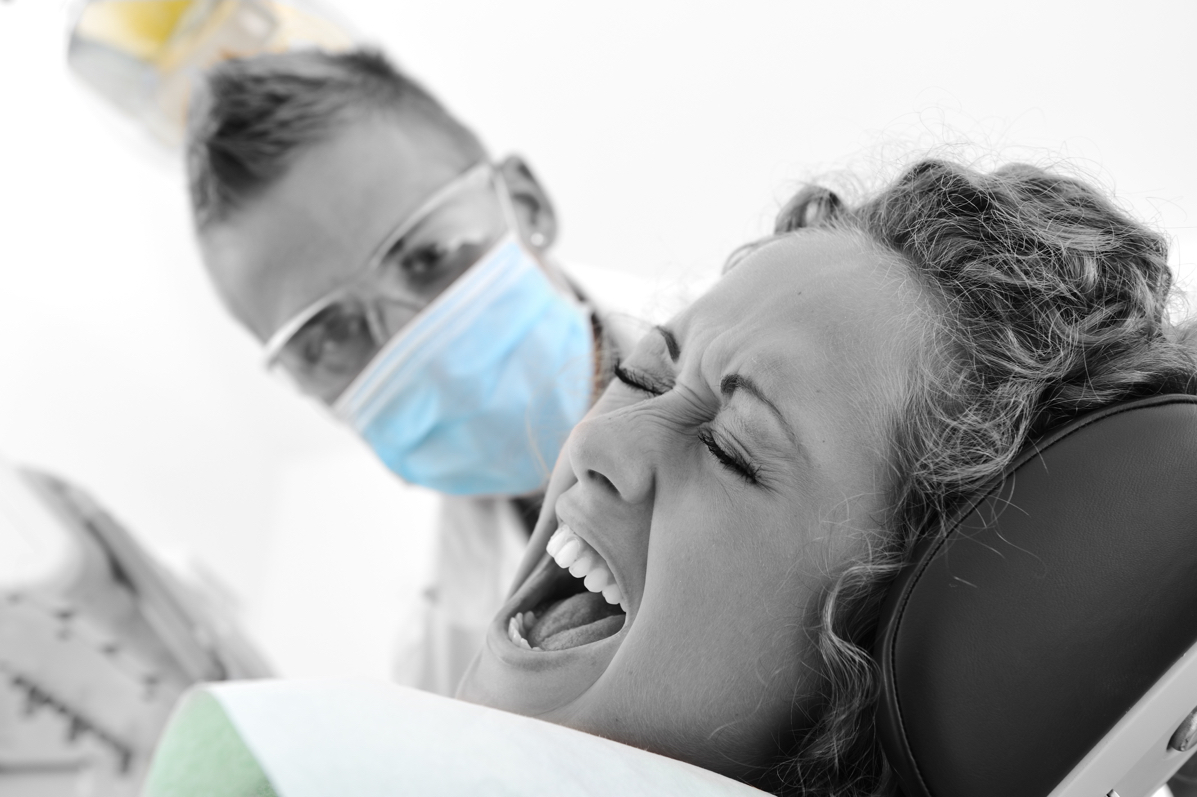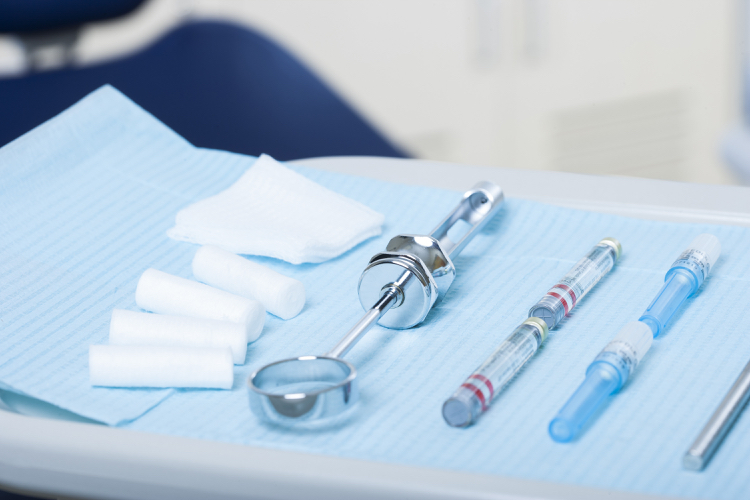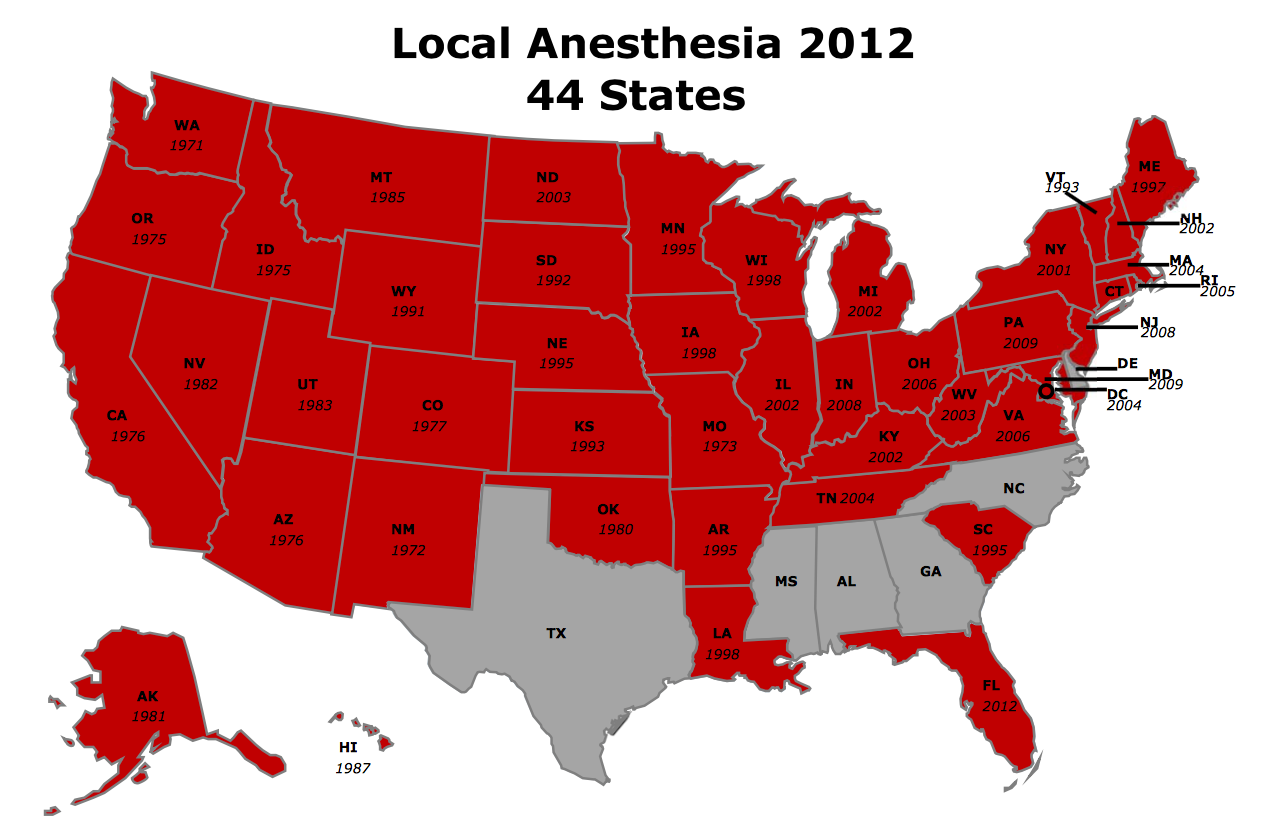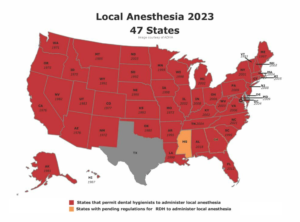
When people talk about what they hate most about going to the dentist, they’re usually talking about the needle. I mean, who in their right mind would ever consent to allowing another person to give a shot in a place that has as many nerve endings as our tongues, lips and cheeks? Shots in the mouth are pretty dang scary. And when you’re trying to calm down and prepare yourself for an injection, it’s almost worse than trying to relax for the air-burst thingy they do at the optometrist’s office when you’re getting your eye pressure checked.

And yet, anyone who has had significant dental treatment performed has allowed someone to inject their mouth with a needle, right? We’ve all accepted the fact that shots are so much better than the actual thing that we hate about going to the dentist.
Pain. Pain is what we really hate.
And shots? They make pain go bye-bye. No shot? You’re all-knowing (in a very bad way) about every little thing that is getting fixed in your mouth.
But you already realize this unpleasant truth. What you might not know is that there’s a stink in Texas right now about who can give shots at the dentist’s office and who can’t. Here’s a little backstory: Dentists go to college for 6-8 years to learn all the things they need to do in order to be dentists. Dental hygienists are in college for 2-4 years to learn everything they need to learn in order to be dental hygienists. In states that allow dental hygienists to give shots, their anesthesia education follows the same curriculum as dentists. These states also test dentists and hygienists to make sure that they are qualified to give shots before granting their licenses.
In Texas and five other states, this is not true. A dental hygienist’s education in regards to anesthetic delivery is considered inferior, and therefore, allowing hygienists to stick a needle in a patient’s mouth allegedly places the public in unnecessary danger.
On this map, you’ll see red states, with years next to their abbreviations. These are the states that allow hygienists to give shots, along with the dates when administration and licensing first became available. [edit: See image at update at the bottom of this article – this was amended to 47 states in 2023]

Do I think that Texas should allow dental hygienists to give shots just because “everyone else is doing it?” No. We tried being our own country once, and if we still were our own country we wouldn’t care one tiddly bit what was going on in the US.
The reason that Texas should allow dental hygienists to give shots is simple:
We are tired of hurting people.
The alternative is to ask the dentists we work with to leave a hole in their schedule so they can come give a shot for us. And come anesthetize again if the first time didn’t work. And again if our patient is still in pain.
Here in Texas, hygienists learn to say “I’m Sorry” a lot to our patients, instead of continuing to interrupt our dentists.
Thankfully, most of our patients don’t need shots. Those who come regularly have healthy mouths and their visits with the dental hygienist are preventive in nature, comfortable, maybe even relaxing. But take a person who has been scared to go to the dentist for a while and they’ve noticed that their gums bleed when they brush. There are sores in their gums, and guess what? The treatment it takes to heal up those sores can hurt! Hygienists in all states are highly trained to provide this deeper therapy – it’s what we “really” do. And if there are obstacles to providing this treatment painlessly, well, it’s either not going to be painless, or else the treatment won’t be as thorough as it would have been if it would have been if the patient had gotten completely numb.
Last week’s hearing of the Texas Senate Committee on Health and Human services highlighted the stances of those both in favor and against granting dental hygienists the permission to deliver local anesthesia, in other words “give shots.” The original video was 2 1/2 hours – I’ve shortened it down to a little under 40 minutes of testimony only about this bill, edited out all the procedural or repetitive bits, and left the juiciest parts behind.
Full video of the archived meeting: http://tlcsenate.granicus.com/MediaPlayer.php?view_id=42&clip_id=11813
Here are my bullet points, yes… •Bullet •Points for this committee meeting:
• The map handed out in the chamber is the same one you see in this article (feel free to scroll up and follow along).
• The bill is permissive, not mandatory. If a dentist does not want to allow a hygienist in their office to give shots, they can’t. Furthermore, dentists must be present in the office for hygienists to administer anesthetics.
• No evidence of harm is presented in any testimony. Scroll to 18:45 where you’ll see Dr. Scott Dowell testifying for the Texas Society of Periodontists against this bill. His admission of the relative danger of local anesthesia is…interesting.
• The Texas Dental Association states that they opposed to this bill due to patient safety because they feel that it lowers the education standard and it’s only about expanding dental hygienist’s scope of practice, possibly to open the door to independent practice by hygienists.
• Dr. Matthew Roberts, who represented the Texas Dental Association, seemed surprised to learn that physicians are legally allowed to delegate the duty of administering anesthesia shots to even medical assistants in their practice when this is brought up in the meeting.
• There are 9000 members of the Texas Dental Association, but in a poll, 53% of the members were actually in favor of hygienists giving shots.
• The amount of training dentists receive to legally put patients “to sleep” is less than the training hygienists receive in order to be legal to give shots.
If you’re not convinced by this video, then you didn’t actually watch it (my opinion, sheesh!). But if you did watch it and still feel like hygienists are unqualified to give shots, your voice is very important to us right now. Maybe there are more problems with hygienists using needles, maybe there are negative reports that haven’t been correlated properly. Do you have concerns? Post them here in the comments below. I’m serious – if there is a compelling reason that is being hidden from the public and even from hygienists, we all deserve to know the truth.
At this point, though, if the day ever comes when I’ll be able to give my patients shots, it will be like someone trusted me with the most delicate equipment available in the Compassion Toolbox. It is a precious gift to be able to deliver painless dental care, and for those in the caring business (which most of medicine is, if you think about it) sometimes it’s the best gift we can give to others.
Yuck, ick, too late, the mush landed. Bottom line? Please don’t hate me if I ever get to stick you with a needle.
![]()
 Trish Walraven RDH, BSDH is a dental hygienist who lives in the suburbs of Dallas/Fort Worth. She longs for the day when she can drop a couple grand of her own money and leave her family to take a week-long college course, just so she can sit for an anxiety-provoking board exam that will grant her the license to poke a shot in places that no one wants poked. Goals, man. Goals.
Trish Walraven RDH, BSDH is a dental hygienist who lives in the suburbs of Dallas/Fort Worth. She longs for the day when she can drop a couple grand of her own money and leave her family to take a week-long college course, just so she can sit for an anxiety-provoking board exam that will grant her the license to poke a shot in places that no one wants poked. Goals, man. Goals.
UPDATE 4/5/2017: The April newsletter from the TSBDE states that SB 430, which would authorize dental hygienists to administer local anesthetic was heard in the Senate Health and Human Services Committee on March 8, 2017. The committee considered testimony both for and against the legislation. The bill was voted out of the Health and Human Services Committee on April 5, 2017 with some changes. The change is that only infiltration administration would be permitted. The bill is now waiting to be scheduled to be heard by the full Senate.
UPDATE 5/25/2023:
It’s been six years since the original article above was posted; however, today I received the following information:
“After almost a year of collaboration between TDHA [Texas Dental Hygienists’ Association] and TDA [Texas Dental Association], legislation passed today through the Texas Senate that would allow Texas dental hygienists to administer local infiltration anesthesia.
The last step is for Governor Abbott to approve and sign the bill which would then become law. After the legislation is signed by the Governor, the Texas State Board of Dental Examiners will be tasked to write specific rules and educational requirements that will align with the intent of the legislation. This is a lengthy process that can take up to a year. The rules will then need final approval from the Governor’s Office.
Please note – this legislation allows dental hygienists to administer local anesthesia under the direct supervision of a dentist via infiltration only to patients who are over the age of 18.”
Here’s the thing: this was also the biggest bone of contention even in the 80’s and 90’s for the majority of Texas dental hygienists. For over 30 years we have been arguing for this option! That’s pretty much the scope of an entire career. Enough said – all you 50+ year olds who’ve been waiting for this day? See y’all back in college soon! 
